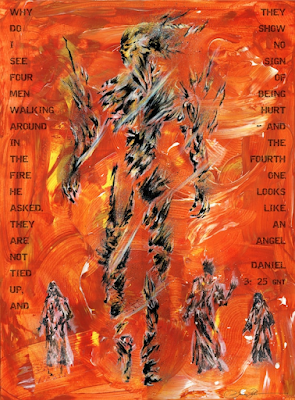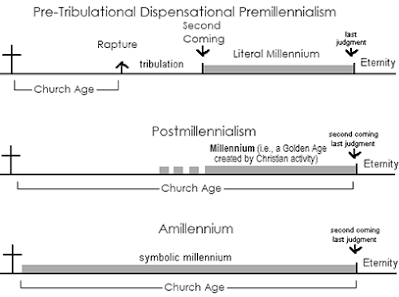5. The Miraculous Deliverance & its Aftermath (3:24-30).
v. 24a: Then Nebuchadnezzar the king was astounded…
o Another rapid change in the King’s temperament: shock & awe (cf., Dan. 5:6)!
Prov. 21:1: The king's heart is a stream of water in the hand of the LORD; He turns it wherever He will.
v. 24b: "Was it not three men we cast bound…”
o The key emphases: “three” and “bound.”
v. 24c: They replied to the king, "Certainly, O king."
o The King’s question provokes a confession of truth by his high officials.
o A Sovereign GOD is in control of the situation!
v. 25a: He said, "Look! I see four men loosed and walking about in the midst of the fire without harm…”
o Unlike the apocryphal Greek “additions,” which picture an angel extinguishing the fire (3:49-50, in the Douay-Rheims numbering of verses), the canonical Aramaic version makes it clear that the men were preserved “in the midst of the fire.”
o The only thing disturbed was their bonds! Persecution only liberates the believer!
Matt. 5:11-12: “Blessed are you when others revile you and persecute you and utter all kinds of evil against you falsely on my account. Rejoice and be glad, for your reward is great in heaven, for so they persecuted the prophets who were before you.
o There is much blessing that comes from persecution & other assorted trials!
o It increases our dependence upon God and His grace (e.g., in 2 Cor. 12:9-10, God denies Paul’s prayer request to remove the thorn in the flesh because He wanted to give Paul something better than physical comfort)…
o It serves to embolden and toughen the believer (James 1:2-3)…
o It earns us crowns & rewards (Rev. 2:10)…
o We are encouraged in our identification with Christ—both in present suffering and in future glory (Rom. 8:17-25; 1 Pet. 4:12-19)…
o It serves as an example unto others (Heb. 11:32-40)…
o In Intertestamental times, the dying Matthias encouraged his sons to continue the Maccabean Revolt by pointing to examples such as that of the Three Holy Children, as recorded in the non-canonical history of 1 Macc. 2:59: “Ananias, Azarias, and Misael, by believing were saved out of the flame.”
o The author of Hebrews makes an oblique reference to this incident as an example of those who, by faith, “quenched the power of fire” (Heb. 11:34).
o Martin Luther was encouraged by the events of Daniel 3 when facing possible death & betrayal in connection with his appearance before the Diet of Worms (1521). Note his letter unto his prince, Elector Frederick the Wise:
You ask me what I shall do if I am called by the emperor. I will go even if I am too sick to stand on my feet. If Caesar calls me, God calls me. If violence is used, as well it may be, I commend my cause to God. He lives and reigns who saved the three youths from the fiery furnace of the king of Babylon, and if He will not save me, my head is worth nothing compared with Christ. This is no time to think of safety; I must take care that the gospel is not brought into contempt by our fear to confess and seal our teaching with our blood.
o
Even
as Adolf Hitler would later have the torturous deaths of the 1944 July Plot
conspirators filmed for his personal amusement, Nebuchadnezzar took a “ringside
seat” to watch the horrific deaths of the young men.
Dan.
3:25b: “walking about in the midst of the fire without harm…”
o
Indicative
of the huge size of the furnace…
o
A
spectacular deliverance that pre-figures the fulfilment of the promise of Isa.
43:1-2, in which the entire Hebrew nation will be purged and cleansed by
the fire of the Great Tribulation (cf., Isa. 4:4) in preparation for Millennial
Glory, even as the oppression of Pharaoh had prepared them for the Exodus unto
the Promised Land (Deut. 4:20, 1 Kings 8:51, Jer. 11:4).
Isa. 43:1-2: But now, thus says the LORD, your
Creator, O Jacob, and He who formed you, O Israel, "Do not fear, for I
have redeemed you; I have called you by name; you are Mine! When you pass
through the waters, I will be with you; and through the rivers, they will not
overflow you. When you walk through the fire, you will not be scorched, nor
will the flame burn you.”
Isa. 4:3-4: It will come about that he who is
left in Zion and remains in Jerusalem will be called holy—everyone who is
recorded for life in Jerusalem. When the Lord has washed away the filth of the
daughters of Zion and purged the bloodshed of Jerusalem from her midst, by the
spirit of judgment and the spirit of burning, then the LORD will create over
the whole area of Mount Zion and over her assemblies a cloud by day, even
smoke, and the brightness of a flaming fire by night; for over all the glory
will be a canopy.
Deut. 4:20: "But the LORD has taken you
and brought you out of the iron furnace, from Egypt, to be a people for His own
possession, as today.
In His Judgments, such as the Babylonian Exile,
God does not destroy, but rather, refines His chosen Covenant People
(Isa. 48:10; Ezek. 22:17-22).
Isa. 48:10: Behold, I have refined you, but
not as silver; I have tried you in the furnace of affliction.
 |
| "The Fourth Man-Ver. 1" AscendingArtz |
v.
25c: “…and the appearance of the fourth is like a son of the gods!"
o What is the best
rendering of the Aramaic?
“and the form of the fourth is like
the Son of God” (KJV,
NKJV)
“and the appearance of the fourth
is like a son of the gods!" (NASB, NIV, ESV, ASV)
“and the appearance of the fourth
resembles a divine being.” (ISV)
o There is no definite
article (“the”) in the original Aramaic.
o “Elohim” can be
used of the One True God—but can also be rendered in the plural as “gods.”
o Translators historically
equivocate; it seems that the KJV rendering is offered out of theological
considerations—as opposed to strictly grammatical ones. The Aramaic seems
to indicate that the Fourth Man was, in some unspecified manner, “god-like,”
from King Nebuchadnezzar’s perspective.
NET: “And the appearance of the fourth is like
that of a god!”
o Nebuchadnezzar’s
further commentary interpreting the identity of the Fourth Man (v. 28, “angel”)
seems consistent with the NASB/NIV rendering.
A. This comment by Nebuchadnezzar raises two
questions:
1.
What did Nebuchadnezzar—a pagan—mean in using this
phrase, with regard to his own subjective level of understanding?
2.
Objectively speaking, WHO was the Fourth Man, in reality?
Is the Fourth Man the Angel of the Lord (i.e., a Divine Theophany, the
Preincarnate Eternal Son; cf., Judges 13), or a created angel sent by God (cf.,
Dan. 6:22)?
o
Nebuchadnezzar,
as an OT-era pagan, would have no knowledge (unless it were divinely revealed)
of the Triunity of God, or of the unique and distinct Personality of the Divine
Son.
o
However,
Nebuchadnezzar, under God’s direction, could have unconsciously spoken “better
than he knew,” much like Caiaphas (John 11:49-52) or Pilate (John 19:19).
o
A
“son of God” could be understood in the OT sense, referring unto an angelic-being
(v. 28; cf., Job 38:7); or, conversely, “a son of the gods” could be
understood in a pagan, polytheistic sense (i.e., an awesome member of a divine
polytheistic pantheon).
o
The
Jewish Talmud affirms that the Fourth Man should be identified as the
angel Gabriel (cf., Dan. 9:21).
o
Christian interpreters, on the other hand, have often
(but not dogmatically, nor universally) been inclined to affirm that Fourth Man
is the Divine and Pre-incarnate Christ, the Eternal Son of God.
o
Objectively, it cannot be dogmatically affirmed whether or
not the Fourth Man is the Angel of the LORD (i.e., a Christophany—a
pre-Incarnate manifestation of the Son), or a created-angel who was employed instrumentally
by God (cf., Acts 12:7). There is nothing that would utterly demand—nor rule-out—either
position.
o If this incident is viewed
as a direct fulfillment of Isa. 43:1-2, it could well be argued that the
Rescuer, the Fourth Man, is in fact the pre-Incarnate Christ—the same One who
would later stand alongside Paul during his hour of trial at Jerusalem (Acts
23:11)!
o Certainly, it would not
be inconsistent with the spirit of prior revelation to strongly suspect that
the Fourth Man who stood with the Three Holy Children in the midst of the fire was,
in point of fact, that very same One who…
…walked
with Adam & Eve in the Garden (Gen. 3:8)…
…communed
with Abraham by the Oaks of Mamre (Gen. 18:1)…
…provided
for Hagar & Ishmael in in the wilderness of Beersheba (Gen. 21)…
…wrestled
with Jacob at Peniel (Gen. 32:24-30)…
…spoke
to Moses out of the Burning Bush (Gen. 3:1-4:23)…
…met
Joshua as the Commander of the Army of the LORD (Josh. 5:13-15)…
…encouraged
Gideon at the oak that was in Ophrah (Judges 6:11)…
…amazed
Manoah & his wife at Zorah (Judges 13:2)…
…called
Isaiah in the year that King Uzziah died (Isaiah 6:1-13)…
…struck
down 185,000 Assyrians in the Days of Hezekiah (2 Kings 19:35)…
o Given the context of
the close thematic relationship between this narrative and that of chapter 2, it
would be unsurprising if King Nebuchadnezzar should personally be suffered to come
face-to-face with that great Heavenly Stone that ultimately pulverizes and utterly
annihilates the great colossus that represents Gentile World Power (Dan. 2:44-45).
o
On Old Testament Theophanies.
o Theophanies:
an important OT Era method of Divine communication with men, in that no
man, in this flesh, can behold the Divine Essence (Ex. 33:20).
o A Theophany
is a temporary & sudden manifestation of Deity in a sensible form
that is tangible unto the human senses.
o
Theophanies are NOT like the Incarnation
(Isa. 7:14)! Rather, they are temporary
manifestations; not a
genuine or permanent assumption of humanity. Theophanies had no past, nor
future; only a brief ministry for revelational purposes.
o
It
seems that Theophanies were usually the Son (i.e., Christophanies),
prefiguring and anticipating the Incarnation and the Son’s role
as the visible Member of the Godhead.
o
An
important exception: in Dan. 7:9 we see a rare theophany of God the Father
as “the Ancient of Days”—appearing with a Christophany (v. 13)!
o
An important Theophany: Christ as “the
Angel of the Lord” (Heb.,
malak YHWH)
o
The
term “Angel” (“Messenger”) is used of men, created angels, and,
in this case, of God Himself. Context determines meaning.
o
“The
Angel of the LORD” can be identified with Christ in His pre-Incarnate state; a
Person identified with God—and yet, distinct in Personality.
o
A functional
emphasis: Christ is YHWH in terms of His Deity, Being, and Essence, and
is thus co-equal with the Father. In relation to the Father, however, He
acts, functionally, as One who is sent.
o This richly anticipates NT revelation
concerning multiple Personality within the Nature of the Godhead.


